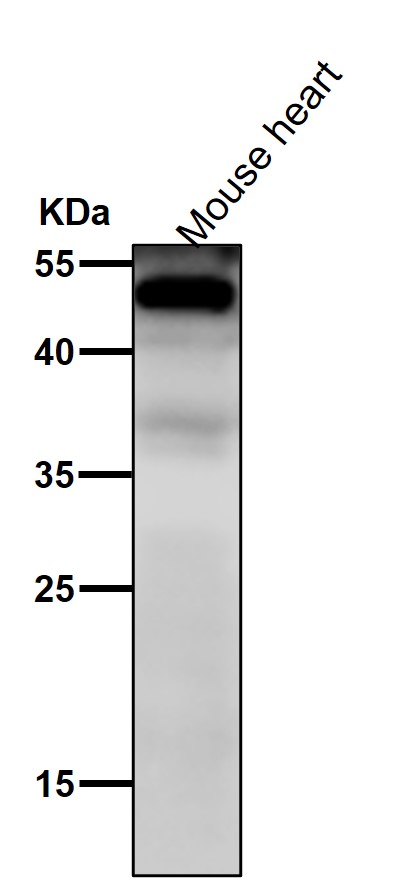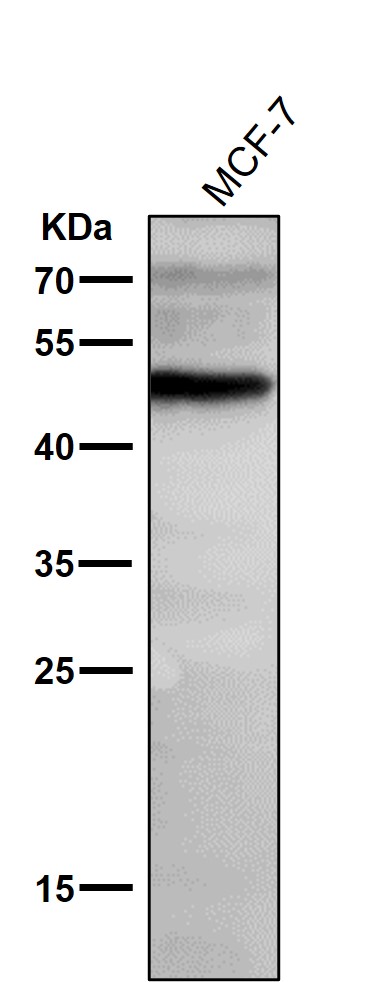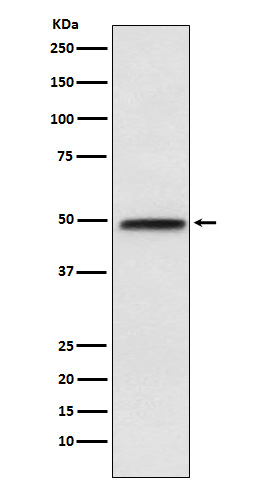


| WB | 咨询技术 | Human,Mouse,Rat |
| IF | 1/20-1/50 | Human,Mouse,Rat |
| IHC | IHC:1/100-1/200;IHF:1/50-1/200 | Human,Mouse,Rat |
| ICC | 1/50-1/200 | Human,Mouse,Rat |
| FCM | 1/20-1/100 | Human,Mouse,Rat |
| Elisa | 咨询技术 | Human,Mouse,Rat |
| Aliases | CTF; HMGIC/NFIB; NF-I/B; NF1-B; NF1B; NF1B2; NFI-B; NFI-RED; Nfib; NFIB2; NFIB3;;NFIB type |
| WB Predicted band size | 47 kDa |
| Host/Isotype | Rabbit IgG |
| Antibody Type | Primary antibody |
| Storage | Store at 4°C short term. Aliquot and store at -20°C long term. Avoid freeze/thaw cycles. |
| Species Reactivity | Human,Mouse,Rat |
| Immunogen | A synthesized peptide derived from human NFIB type |
| Formulation | Purified antibody in PBS with 0.05% sodium azide,0.05% BSA and 50% glycerol. |
+ +
以下是3篇涉及NFIB/NFIB2抗体的相关文献摘要信息(注:部分文献可能因命名差异需结合具体研究背景确认):
---
1. **文献名称**: *NFIB promotes cell survival by directly suppressing p53 transcription in TP53-mutant cancers*
**作者**: Wang X, et al.
**摘要**: 本研究利用NFIB抗体(Western blot和ChIP实验)揭示了NFIB在TP53突变肿瘤中通过直接抑制p53转录调控网络促进癌细胞存活,为靶向NFIB的癌症治疗提供依据。
---
2. **文献名称**: *Nuclear factor I/B (NFIB) regulates chromatin dynamics in developing cortical astrocytes*
**作者**: Piper M, et al.
**摘要**: 通过免疫组化(NFIB抗体标记)和染色质分析,发现NFIB在皮质星形胶质细胞发育中调控染色质可及性,影响神经胶质细胞分化与迁移。
---
3. **文献名称**: *NFIB-Mediated Suppression of the Anti-Tumor Immune Response in Melanoma*
**作者**: Chen Y, et al.
**摘要**: 研究采用NFIB抗体(流式细胞术和免疫荧光)证明黑色素瘤中NFIB高表达抑制CD8+ T细胞浸润,提示其作为免疫治疗抵抗的新机制。
---
**注**:若需具体文献DOI或补充其他研究,请提供更详细关键词或研究背景。部分文献可能需结合抗体应用场景(如ChIP-seq、IHC等)进一步筛选。
The NFIB/NF1B2 antibody targets the nuclear factor I/B (NFIB), a transcription factor belonging to the Nuclear Factor I (NFI) family. NFIB plays critical roles in regulating gene expression during development and cellular differentiation. It binds to DNA through a conserved N-terminal domain, facilitating transcriptional activation or repression of target genes involved in organogenesis, particularly in the lung, brain, and skeletal systems. NFIB also interacts with chromatin-modifying complexes to influence epigenetic regulation. Dysregulation of NFIB is linked to developmental disorders and cancers, such as adenoid cystic carcinoma (ACC), where chromosomal rearrangements or amplifications of NFIB drive tumor progression.
The NFIB/NF1B2 antibody is widely used in research to study NFIB's expression patterns, subcellular localization, and functional mechanisms. It aids in detecting NFIB in techniques like Western blotting, immunohistochemistry (IHC), and immunofluorescence (IF), helping to correlate its expression with disease states or developmental stages. Additionally, it is employed in chromatin immunoprecipitation (ChIP) to map NFIB-binding genomic regions. Commercial NFIB antibodies are typically validated for specificity against human, mouse, or rat samples, with isoforms (e.g., NFIB-S, NFIB-L) requiring careful selection based on experimental goals. Understanding NFIB's role through such antibodies contributes to insights into tissue-specific regulatory networks and potential therapeutic targets.
×